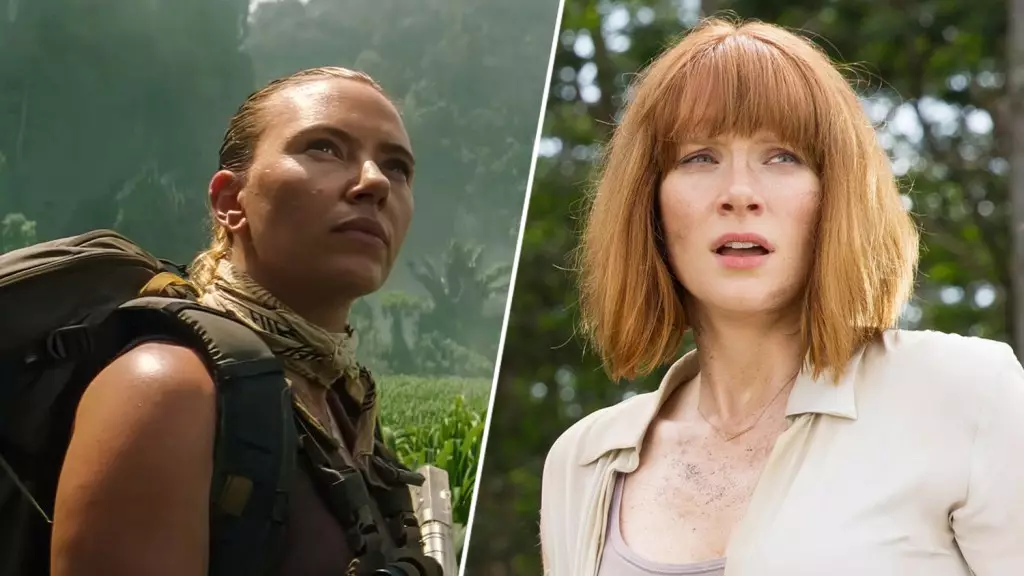The recent narrative surrounding Scarlett Johansson’s inclusion in “Jurassic World Rebirth” reveals more about Hollywood’s gilded culture than genuine camaraderie. While Bryce Dallas Howard’s purportedly warm email might seem like a supportive gesture, it subtly exposes the superficiality often embedded in franchise relationships. Hollywood’s tendency to portray itself as supportive and collaborative masks underlying competitive dynamics, especially among women vying for prominence in male-dominated franchises. Howard’s early outreach, lauded publicly, appears designed less as genuine mentorship and more as a strategic move to uphold the franchise’s image of camaraderie.
The story, at its core, underscores Hollywood’s insistence on portraying unity — perhaps even to mask behind-the-scenes abrasiveness. Johansson’s acknowledgment of Howard’s support takes on an ironic tone when scrutinized beneath the surface. Is this a genuine act of friendship, or merely a calculated gesture to maintain the franchise’s collective façade? Such narratives are often polished for positive publicity, yet they rarely reflect the complex power dynamics and subtle rivalries that characterize Hollywood’s inner workings. If anything, these exchanges serve as social lubricants to smooth over competition, especially as women navigate an industry still rife with inequality.
Reframing the Franchise Narrative: A Sign of Shifting Power Dynamics?
The enthusiastic comments from Bryce Dallas Howard about “Jurassic World Rebirth” and her eagerness to return to the franchise should not overshadow the underlying questions about industry progress. Is the franchise truly a space of mutual support and shared passion, or does it remain a carefully curated act designed to project an image of inclusivity? Howard’s “I’d be back in a heartbeat” statement feels more like a political statement intended to please fans and industry insiders than an authentic desire rooted in artistic pursuit. This sort of boilerplate enthusiasm often masks the fragility of progress — a reminder that token gestures still dominate diversity and inclusion narratives.
Moreover, Johansson’s entry into the franchise sheds light on a broader shift: women are increasingly expected to support each other publicly in ways that sometimes feel performative. The Hollywood ecosystem rewards this superficial unity, all while leaving unresolved issues of gender inequality, pay disparity, and creative control unaddressed. While Johansson’s participation challenges traditional gender roles within blockbuster franchises, it simultaneously highlights how far the industry still needs to go before such support becomes genuine and substantive.
Franchise Culture: A Double-Edged Sword for Female Representation
The shared excitement over new installments and casting announcements reveals a collective marketing strategy disguised as camaraderie. It’s tempting to see these moments as stepping stones for better female representation, yet they can also perpetuate a shallow culture where women are valued more for their marketability than their talent. Howard’s praise for her fans and her expressed eagerness to return may reaffirm her commitment to her role, but it also underscores how female stars continue to be co-opted into franchise narratives that prioritize spectacle over substantive change.
This is especially pertinent when considering Johansson’s role as Zora Bennett — a character entrenched in action and espionage, roles traditionally lacking in complexity for women. Her presence is undoubtedly meaningful, but it raises questions about the quality of such representations. Are they genuinely empowering, or are they just another example of Hollywood weaponizing female actors to boost franchise longevity? The industry’s diagnosis of “supportive sisterhood” frequently collapses under scrutiny because it often serves as window dressing for systemic issues that persist unchecked.
Ultimately, the discourse on support between actresses within franchises reflects the broader tensions in Hollywood — an industry eager to appear progressive while maintaining antiquated power structures. Genuine change demands more than heartfelt emails and enthusiastic hashtags; it requires a fundamental shift in how creative influence, gender equity, and industry respect are valued. Until then, these stories of camaraderie are often as performative as they are poignant, serving only to distract from the real work left unfinished.



Leave a Reply